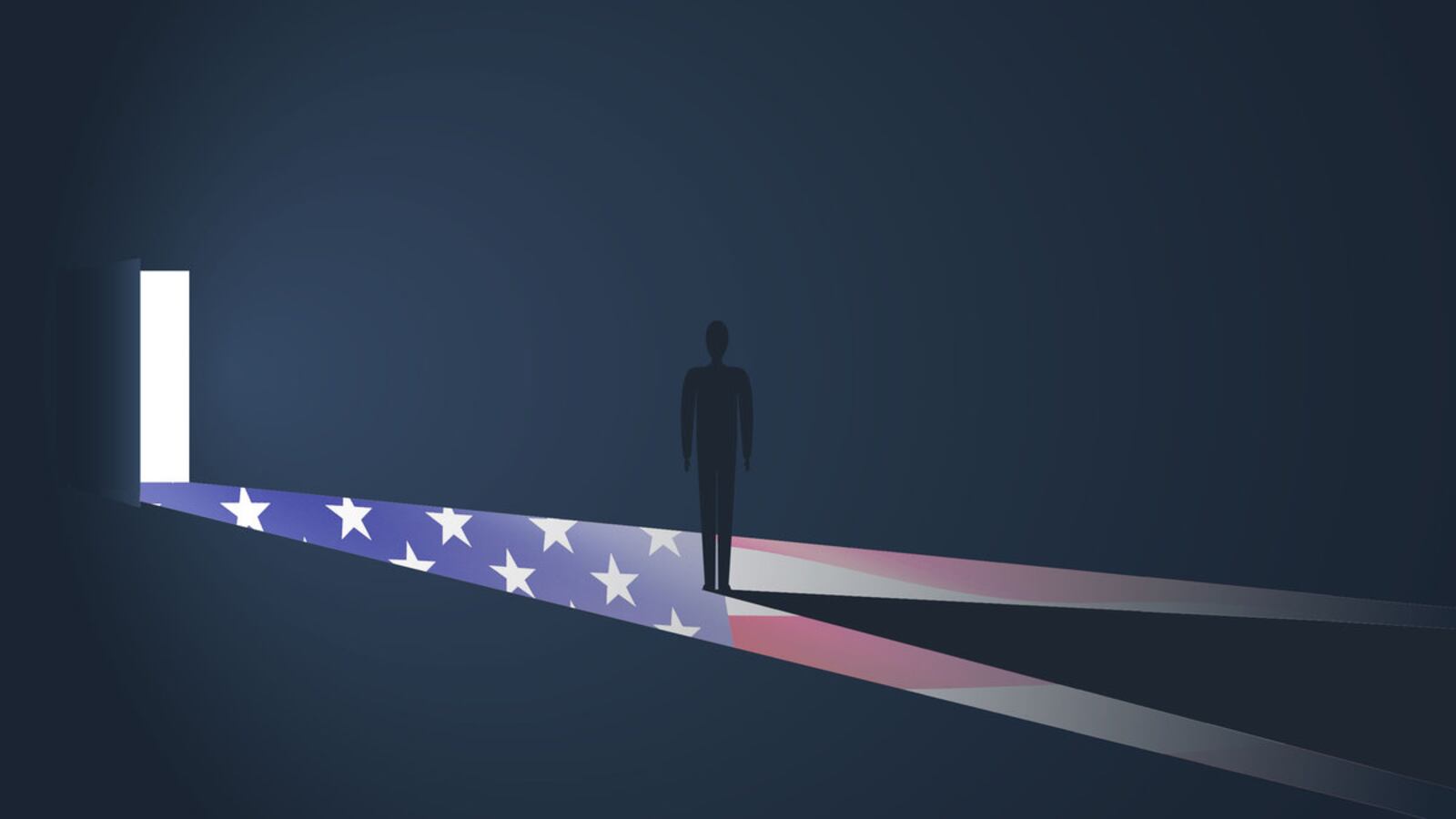Is it time to leave?
I’ve caught myself asking my wife this question several times over the past year. We were both born and raised in America, a country of opportunity for our immigrant parents who left Pakistan with little more than hope and belief in a dream that anyone, even brown-skinned Muslims, with some luck and hard work, could make it and be accepted. But that dream is becoming a nightmare.
If you’re a person of color, it seems foolish and reckless to not, at least, have an exit plan when looking at the political and cultural landscape.
This is not a flippant or hyperbolic thought exercise, and I’m not the only one to increasingly ponder the question: “Where else can we go when this country turns on us?”
Earlier this week, New York Times journalist Farnaz Fassihi was trolled and harassed on Twitter for simply stating the following: “I’m a child of immigrants. When I was a kid, everyone I knew wished they could raise their children in America, now, everyone I know wishes they could raise their children outside of America.”
If you’ve traveled and talked to people over the past few years, her statement wasn’t extraordinary, it’s a sadly common utterance. Most people around the world aren’t rejoicing at America’s self-inflicted downfall, they’re looking at us with pity, sadness, and a desperate hope that we get our shit together. After all, the United States is still the most powerful and wealthy country in the world, and a doorstop against rising authoritarianism.
It is also, unfortunately, number one in all the wrong categories. We lead the world in COVID-19 deaths due in large part to rampant right-wing disinformation about vaccines. We have 390 million guns for 330 million people, so it’s not surprising we lead the world in mass shootings and gun-related deaths. (While I was writing this column, we just witnessed another deadly shooting in Tulsa—just as the 21 victims of last week’s Uvalde, Texas, shooting are being buried.)
We don’t ban assault rifles, but we do incarcerate more people than any nation on Earth. We’re the only industrialized country that doesn’t guarantee paid parental leave, but we’re so “pro-family” that we’re restricting women’s rights to abortion, even as many countries continue to expand them. And for the first time, the U.S. was labeled a “back-sliding democracy” by the International Institute for Democracy and Electoral Assistance, due to the actions of the Trump administration.
It’s pretty clear that this country and its democracy aren’t trending in the right direction.
Just this week, we’ve learned that the GOP is unleashing a multi-pronged precinct strategy using Republican operatives to allege voter fraud in close elections. A majority of Republican voters believe in the Big Lie that the 2020 presidential election was stolen, and nearly 65 percent of them believe in an aspect of the white supremacist “replacement theory.”
These talking points are now mainstream, thanks to Fox News and Republican elected officials. Conspiracy theories—such as QAnon and the associated “groomer” panic—have radicalized individuals to commit violence, including members of the violent mob that tried to overthrow our free and fair election on Jan. 6. It’s a near certainty that numerous QAnon supporters will be elected to office this November.
If Republicans take control of the political leadership of Congress, which seems likely, they will be beholden to an increasingly radicalized and weaponized base that is fine using violence to “take back their country.”
Meanwhile, Republicans refuse to move against white supremacist terrorism, which is the number one domestic terror threat in the country. Instead their colleagues, Reps. Marjorie Taylor Greene and Paul Gosar, openly attend conferences hosted by Nick Fuentes—a notorious antisemite and white nationalist. The hoods are off, and there’s no turning back for the GOP.
As a Muslim, I saw President Donald Trump openly say, “I think Islam hates us.” He ran on a promise to enact a “complete and total ban” on Muslims. He was not only elected as president in 2016, but he received 11 million more votes after spending four years doubling down on chaos, hate, xenophobia, and cruelty. History has taught us that when authoritarian movements see people as problems, they usually come up with gruesome and horrific solutions.
It’s tough to love a country that doesn’t love you back, and even tougher to fight for it as it’s trying to kill you.
Unfortunately, the last two years have revealed that the institutions that have the power to respond have repeatedly failed. Media organizations have chosen the path toward self-immolation by rehabilitating their sworn enemies for the sake of profit and ratings. CBS News’ co-president Neeraj Khemlani rationalized the hiring of former Trump chief of staff Mick Mulvaney as a contributor by citing the need for “access” to a likely Republican administration in the future. Most media outlets will fail us as they “both sides” our democracy towards fascism.
Corporations, historically, have always paved the road for fascist leaders, because it’s good for business—until it isn’t. Disney is learning this the hard way after enduring Florida Gov. Ron DeSantis’ wrath for balking at his hateful “don’t say gay” policy. That was a warning shot across the bow for all business leaders to get in line or face the GOP boot.
Meanwhile, it’s apparent that most Democrats aren’t built for this challenge. They bring a pencil to a knife fight, while Republicans and Mitch McConnell bring an AR-15. President Biden still refers to Republicans who are committed to obstructing him every step of the way as “rational.” Members of the GOP voted against certifying the election hours after a mob threatening to hang the vice president sacked the Capitol. But some Democrats, especially obstructionists such as Sens. Joe Manchin and Kyrsten Sinema, still think we need the filibuster to preserve bipartisanship. Democracy dies, in part, thanks to white moderates who tend to the economic anxiety of “average” Americans while ignoring the lament and cries of the rest of us.
With all this, you can’t blame my father, who’s now in his seventies, for begging me to at least develop an exit plan.
He came to this country after the 1965 Immigration and Nationality Act as a young student. He has never mentioned leaving before, whether it was through the War on Terror or moments of personal crisis when our family weathered poverty, bankruptcy, and incarceration. For the sake of his grandkids, he keeps researching countries where we could possibly go in case it all turns to hell in 2024. He’s narrowing in on Canada and New Zealand. Even though Canada has its right-wing nuts, he says the country at least doesn’t have that many guns, is a short hop across the border, and has affordable health care. New Zealand is on the list because, in addition to being beautiful, it also has smart leadership that rejects gun violence and apparently has a lot of halal options.
As a student of history, I know America has always been a land of violence, hypocrisy, and contradictions—one need only compare its alleged values of egalitarianism with its historical oppression of Black people. However, in the past 60 years, it’s also been a country that has often slowly and painfully trudged forward towards progress. It’s a country where a brown-skinned son of Muslim immigrants who barely spoke English in pre-school is able to pray in a mosque and write articles openly criticizing the government without fear of being tortured or kidnapped.
The question is will my kids’ generation—who will be the first generation of Americans to have fewer rights than the previous one—have the ability to be the protagonist of a country that sees them as villains and invaders?
Over the weekend, I told my wife, “Listen, we should seriously think about the possibility of leaving. We have three kids, and they deserve a chance to be safe.” My wife thought about it, but decided that even though the future does indeed look bleak in America (especially for our democracy), we should stay and fight.
Perhaps because I’m a patriot or a masochist, or both, I agreed. In my heart, I know I’m never leaving. After all, those who have been rejected by America are usually always the ones who have fought and bled for it, still hoping the country will stretch and expand itself to accommodate the rest of us and rise up to its lofty ideals.
I still believe in that America. But, somedays, it’s really tough. My wife and I agreed we’d revisit the conversation in two years—just to be safe.








